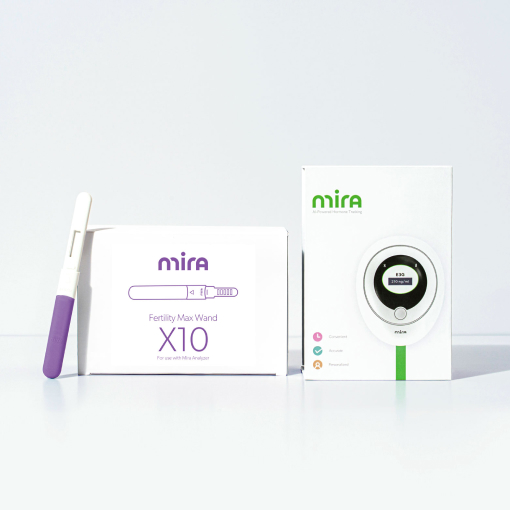How Can I Increase my Chances of Getting Pregnant?

Getting pregnant can take time but there are things you can do to improve your chances of getting pregnant and to get pregnant naturally. From adjusting lifestyle choices to tracking your cycle you can take control of the “trying” part of trying to conceive. In this post we’ll go over some of the things you can do to get pregnant naturally and safely improve your chances. It’s normal to be anxious but taking steps to boost your fertility can help ease your mind and put you on the road to parenthood.
Tips to increase your chances of getting pregnant
We’ve all heard the myths and old wives tales to help you get pregnant, but there are proven things you can do to boost your fertility naturally and help nature take its course. You have more control than you think and these tips can help you improve your chances of getting pregnant.
Get checked
It’s important to get a full and thorough checkup by your primary healthcare provider prior to trying to conceive. Not only does this give you a baseline if you have any issues down the road, but they can make sure you are up to date on everything and as healthy as possible before becoming pregnant. You can discuss any existing health problems and even get screened for genetic diseases or address any other concerns you might have. There are even preconception checklists for men and women that can help you get a jump on any changes you may need to make. From advice on stopping birth control to updating your vaccinations, a checkup before you get pregnant is a good idea.
Timing is everything
When it comes to getting pregnant, timing is everything. Not only do you need to know when you are most fertile, but also when to have sex and how often to have it. If you have a regular cycle, ovulation tracking devices like Mira can help you recognize your LH surge and quickly identify and understand your full fertile window. With numerical hormone readings it takes the guesswork out of fertility. This is especially helpful if you have irregular cycles and have trouble recognizing when you are most fertile. And for those with PCOS or other conditions, it can make all the difference and dramatically improve your chances of getting pregnant.
Tracking your cycle means you knowing when you’re most fertile and when to have sex to maximize that fertility. To maximize your chances you should try and have sex with your partner either every other day or daily during your fertile window. There are even tips for what to do after the deed to help your pregnancy chances.
Prioritize your health
There are many aspects of a “normal” lifestyle that can impact your fertility. Obvious unhealthy habits like smoking and drinking are always the first that come to mind, but prioritizing your health in other ways can help bring your pregnancy dreams to life. Lifestyle changes like maintaining a healthy weight, eating a balanced diet, and getting enough sleep are all factors that can contribute to your fertility. Most doctors recommend eliminating alcohol and quitting smoking, as well as cutting back on your caffeine levels and getting a jump on prenatal vitamins to get the essential minerals and vitamins you need and reduce the risk of certain birth defects.
Pay attention to your stress levels
Stress can be a major factor in achieving your fertility goals. We all experience stress from time to time, but too much stress does not bode well for conception and you should take steps to control the stressors in your life before they can negatively impact your chance of getting pregnant. Stress alone doesn’t cause infertility, but it can make becoming pregnant much more difficult. When you’re stressed the body releases stress hormones and affects multiple systems that can lead to a number of health issues. In terms of fertility, stress can lower your sex drive, cause hormonal imbalances, and weaken your immune system all of which make it difficult to conceive.
There are a variety of ways you can address the stress in your life from meditation to making sure you get enough sleep. Activities like exercise, journaling, and massage therapy among others are all practical ways you can reduce stress while you are trying to conceive.
How long does it take to get pregnant?
With regular unprotected sex, most couples get pregnant within six months to a year. The main factors that affect fertility are age, health, and medical history though, not to mention how often you have sex. The timing of pregnancy can differ greatly from one couple to another.
Since fertility declines with age, this is one of the most important factors in female fertility. If you are under 35 and have been trying for nearly a year, doing all the right things, it may be time to visit a fertility specialist. If you are 35 or above, you should see a doctor as early as possible when TTC.
Additionally, if you have medical conditions or a family history, you should get checked before trying to conceive or see a fertility specialist sooner rather than later. Health conditions like endometriosis, PCOS, and others can all impact your fertility and you should speak to your doctor if you plan on trying to get pregnant.
Best products to buy to get pregnant?
Getting pregnant isn’t just down to luck or the stars aligning. Even if you’re following these tips, there are still things you can do that can help improve your chances of getting pregnant. Tracking your ovulation is the most obvious step so you know when your fertile window is. But tracking it with the help of a digital fertility analyzer can be especially helpful thanks to the numerical hormone readings. It was created to leave no one behind so whether you have irregular periods, PCOS, or other hormonal imbalances, it learns about your cycle, tracks your numeric hormone levels, and gives you a complete overview of your reproductive cycle.
Recommended for you
Navigate your fertility with peace of mind
Sometimes baby-making sex can be less romantic and spontaneous, but you still need to do it if you want to conceive. Lube can help make sex more comfortable for women, and as long as you choose a fertility friendly lubricant, it won’t hurt your chances of getting pregnant while TTC. Studies show your chances of getting pregnant with or without lube are roughly the same, but there’s never a downside to making sex more comfortable and pleasurable and the wrong lubricant can affect sperm in a negative way. Fertility friendly lubes like this one can’t hurt your chances of getting pregnant and are made to promote a healthy, successful conception.
One of the most important factors in achieving pregnancy is the quality of the sperm. If the sperm can’t get where they need to go, natural pregnancy isn’t possible. And since the man is a contributing factor in approximately 50% of cases of infertility, a semen analysis can be an important step to help you on your road to conceiving. With at-home tests like this one, you can analyze not only how many sperm are moving, but the quality of the sample compared to other men who have fathered children. And having the convenience to test at home can remove some of the barriers associated with traditional testing. You’ll have quick results and can even share them with your doctor so you can get pregnant faster by checking the swimmers first.
Conclusion
It can seem like a daunting task to get pregnant naturally, but by following these tips you can improve your chances of getting pregnant. Doing everything possible to prepare your body for a healthy pregnancy starts before you actually get pregnant, but with a little patience and effort, these changes can have you changing diapers in no time!

Mira’s Editorial Process
All content produced by Mira meets stringent editorial standards, ensuring excellence and accuracy in language and medical precision. Every piece undergoes thorough fact-checking and review by qualified professionals. Check out our full editorial process to learn more.








